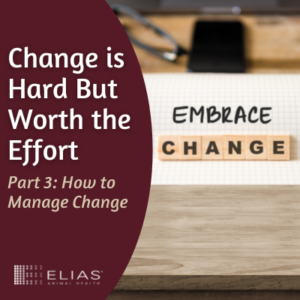 Change. We’ve established that it’s hard all around – for people, leaders, and entire organizations. It requires commitment, willingness to do things differently, and being open to other thought processes and approaches.
Change. We’ve established that it’s hard all around – for people, leaders, and entire organizations. It requires commitment, willingness to do things differently, and being open to other thought processes and approaches.
Successfully executing change is a big deal! However, since companies are ever-moving, growing, shifting, and improving, it’s a never-ending endeavor. By creating a culture of change, organizations can circumvent much of the uncertainty and resistance that accompanies isolated changes. Creating an environment that is change-conducive, flexible, and adaptive supports your team as they shift and adjust – a much better alternative than tossing them into the shark tank!
Forbes published an article a couple of years ago that spotlights 14 Ways To Build a Company Culture That Embraces Change. We’ve discussed much of what they cover in the first 3 installments of this series: Why Change is Hard, The Change Maze, and How to Manage Change.
The authors point out a few more essentials that, when effectively implemented, will establish and foster a culture of change.
- Reassure and Reinforce – Proactive empathy goes a long way in counteracting the uncertainty that results from change.
- Anticipatory Leadership builds systems and structures that view change as part of everyday functioning. It becomes the norm rather than the fear factor.
- Remove the Mystery – Ongoing transparency encourages open communication and alleviates much of the uncertainty that surrounds change.
- Talk About It – A Lot. Clearly communicate not only how change will unfold, but the Why behind the How and What. Encourage questions, and provide solid answers. Provide guidance and support along the way.
- Empower Your Team – to make decisions, prioritize workloads, and learn what they need to know in order to adapt and shift on an ongoing basis.
- Take Breaks. Even the most change-focused organizations and people need time to relax and recover. Build in daily or weekly breaks to encourage your team to breathe and to connect with one another, human to human.
As I review these factors, I realize that every single one of them is people-centric. Culture is created and reinforced rather than implemented as a process. It’s a reflection of feeling valued, of being an essential part of the team and entire organization. It is an intentional, active, ongoing exercise that builds trust, mutual respect, and a willingness to embrace change.
The ELIAS team values a culture of change. Not only does our internal team fully embrace doing things differently, but we also partner with our stakeholders, providing them with the support, resources and information they need to successfully incorporate our cancer immunotherapy into their medical practices. Change is hard, but it’s worth it!
